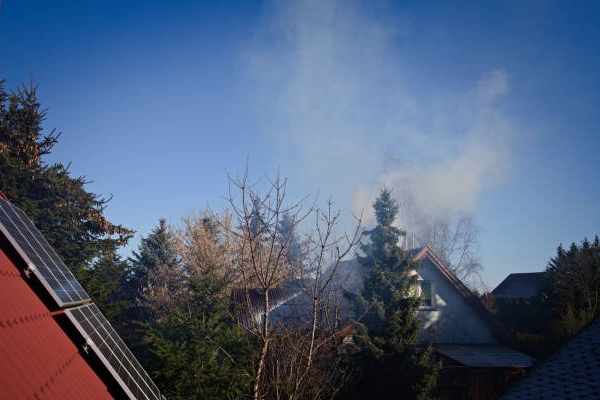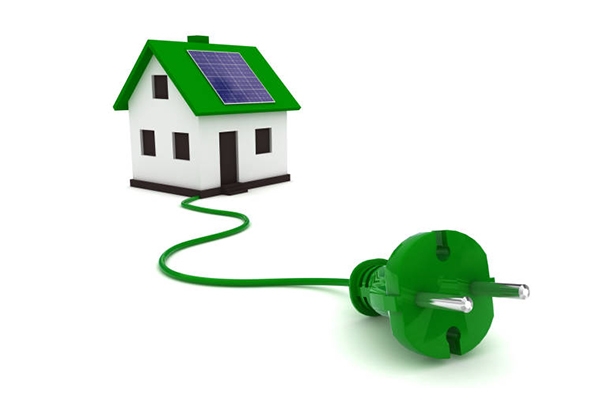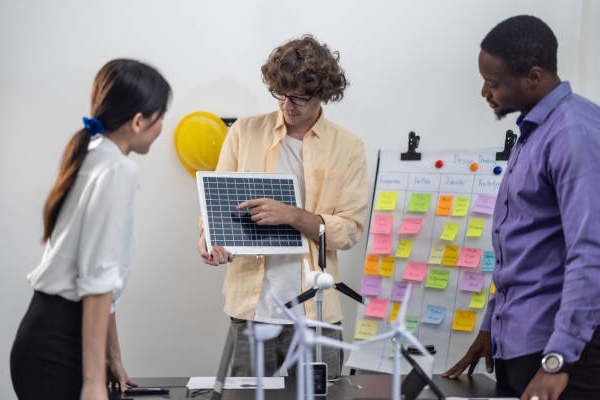With the widespread use of solar panels in homes, doubts about solar systems in terms of safety have grown. Particularly in the case of a fire, the question of whether solar panels pose an additional danger to firefighters has become a concern for many. After all, the combination of an electrical fire and water doesn't sound safe, does it? In this article, we will discuss in detail how fire departments can ensure safety and allay concerns when dealing with residential fires with solar panels.
Many people mistakenly believe that solar panels will continue to generate electricity during a fire, posing a huge safety risk to firefighters. However, the truth is that modern solar systems have been designed with this in mind and are equipped with a variety of safety mechanisms to ensure that power can be cut off quickly in the event of an emergency, thus protecting firefighters. Next, powerhome store will introduce how firefighters deal with fires equipped with solar panels and discuss the relevant safety mechanisms and measures.

Safe Shutdown Mechanisms for Solar Panels
- Quick Inverter Shutdown: When the fire department arrives at a burning house with solar panels, there are two ways they can quickly shut off the power to the solar photovoltaic panels. The first method is to turn off the inverter by simply flipping a switch located on the front panel. The inverter is the device that converts the direct current generated by the solar panels into alternating current. When the inverter is turned off, the solar panels will stop generating electricity in 10 seconds or less. This quick shutdown feature is designed to ensure that in the event of an emergency, the system can be disabled quickly to protect the safety of those on-site.
- Close the AC Disconnect Box: Firefighters will also close the AC disconnect box to further ensure safety. The AC disconnect box is one of the key components that connect the solar system to the home's electrical grid, and shutting off power here effectively stops electricity from flowing back into the grid or the home's circuits. This measure ensures that electricity does not pose a danger to firefighters during firefighting operations.
- Methods of Completely Cutting Power to the Home: Another way firefighters can disable the system is to completely cut power to the home. This method involves cutting the tabs on the bottom of the metering or meter box and then opening the panel to remove the meter. Once the meter is removed, all power to the home will be cut off. This method is slightly more complicated but may be the most effective and necessary measure in some situations.

Why Do Solar Panels Have to Be Turned Off During a Power Outage?
For those who are new to solar energy, they may not understand why grid-tied solar panels must be turned off during a power outage. It's because when utility workers are dispatched to repair an outage line if the solar panels continue to feed excess power back into the grid, it creates a dangerous "islanding" condition for those workers. Simply put, the islanding effect means that the solar system is still supplying power to the grid while the grid is down, which can lead to abnormal voltages and currents in the area of the grid, posing a threat to maintenance crews. Therefore, quick shutdown of the solar system is not only to protect the equipment but also to ensure the safety of maintenance personnel.
The quick shutdown feature exists for safety, whether it is an unplanned power outage or a fire. With this safeguard, firefighters will no longer have electrical safety concerns when fighting fires involving solar energy with water. This feature, through the linkage of the inverter and the AC isolation box, realizes a quick and safe power cut-off, guaranteeing the safety of the fire-fighting process.
Education and Popularization of Solar Energy Systems
Understanding how solar systems work and their safety mechanisms is important for both homeowners and the public, and companies such as POWERHOME have done a great deal of work in this area to help more people understand the safety and benefits of solar energy through education and outreach. The presence of the Rapid Shutdown feature ensures that whether it is an unplanned power outage or an emergency such as a fire, the solar system can be stopped quickly and safely to protect the safety of those on-site.

As solar technology continues to advance, solar systems have been significantly improved in terms of safety. Not only do modern solar systems generate and conserve energy efficiently, but they are also equipped with a variety of safety mechanisms to ensure that they can shut down quickly in an emergency, protecting firefighters and electrical workers. Through proper design and use, solar energy systems are not only an environmentally friendly option, but also a safe and reliable energy solution.
Installing solar panels on your home is not only an environmentally friendly decision, but also an investment in your future. To ensure that your investment is protected in every situation, it is equally important to understand the safety mechanisms of your solar system and how to insure it. By speaking with your insurance company and solar provider, you can choose the right insurance coverage for your solar system and ensure that you are fully compensated in the event of an unexpected loss.
Continuing to learn and understand the latest technology and safety measures for solar energy systems is crucial for every solar energy user. By participating in relevant training and educational programs, you can gain a better understanding of how to safely use solar energy systems in your home and take the right steps in case of an emergency.
With the widespread use of solar technology, it is especially important to know how to handle solar systems safely. Fire departments have the knowledge and equipment necessary to quickly and safely disconnect solar panels during a fire, ensuring safe fire suppression operations. Homeowners also don't need to worry about the safety of their solar panels in a fire, as modern solar systems are designed with a variety of emergency measures in mind, including quick shut-off features and isolation devices.
If you're considering installing solar panels, it's worthwhile to get more information and advice from a professional company such as POWERHOME to ensure that your solar system is not only energy efficient but also safe in the event of an emergency. By understanding how solar energy works on cloudy day and the safety measures in place, you can better protect your investment and take the right response when needed.
(1).png)
(1).png)